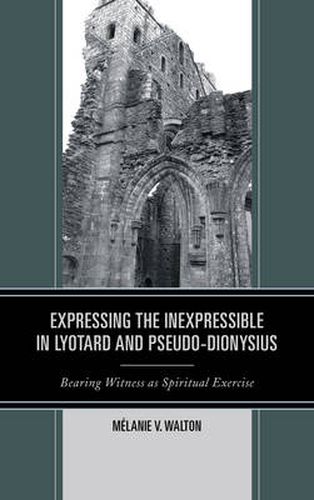Readings Newsletter
Become a Readings Member to make your shopping experience even easier.
Sign in or sign up for free!
You’re not far away from qualifying for FREE standard shipping within Australia
You’ve qualified for FREE standard shipping within Australia
The cart is loading…






Testimony demands the witness to demonstrate her knowledge-that knowledge that she must have by the fact of being a witness to something, even if this something exceeds the possibility of expression by any means amenable to verification. Expressing the Inexpressible in Lyotard and Pseudo-Dionysius: Bearing Witness as Spiritual Exercise rigorously studies the inexpressible expression provoked by two illustrative examples: the silenced testimony of the Holocaust survivor, in Jean-Francois Lyotard’s The Differend, and the religious faithful, in Pseudo-Dionysius’ The Divine Names. Though coming from vastly different philosophical moments, the methods used by Lyotard and Dionysius prove to dissolve the apparent heterogeneity of postmodernism and Neoplatonist Christian mysticism and open radical new lines of dialogue. Melanie Victoria Walton critically evaluates each thinker and tradition, rethinks witnessing, testimony, sublimity, and apophaticism, and then engages them together to forge a new reading of silence and eros. The resulting insights will be especially valuable to students and scholars of Continental philosophy, philosophy of religion, theology and religious studies, medieval studies, and Holocaust studies.
$9.00 standard shipping within Australia
FREE standard shipping within Australia for orders over $100.00
Express & International shipping calculated at checkout
Stock availability can be subject to change without notice. We recommend calling the shop or contacting our online team to check availability of low stock items. Please see our Shopping Online page for more details.
Testimony demands the witness to demonstrate her knowledge-that knowledge that she must have by the fact of being a witness to something, even if this something exceeds the possibility of expression by any means amenable to verification. Expressing the Inexpressible in Lyotard and Pseudo-Dionysius: Bearing Witness as Spiritual Exercise rigorously studies the inexpressible expression provoked by two illustrative examples: the silenced testimony of the Holocaust survivor, in Jean-Francois Lyotard’s The Differend, and the religious faithful, in Pseudo-Dionysius’ The Divine Names. Though coming from vastly different philosophical moments, the methods used by Lyotard and Dionysius prove to dissolve the apparent heterogeneity of postmodernism and Neoplatonist Christian mysticism and open radical new lines of dialogue. Melanie Victoria Walton critically evaluates each thinker and tradition, rethinks witnessing, testimony, sublimity, and apophaticism, and then engages them together to forge a new reading of silence and eros. The resulting insights will be especially valuable to students and scholars of Continental philosophy, philosophy of religion, theology and religious studies, medieval studies, and Holocaust studies.